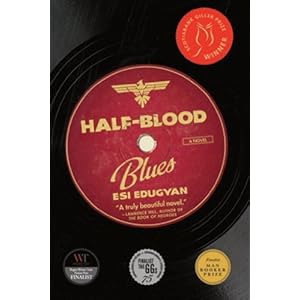 Esi Edugyan is the author of Half Blood Blues. Her second novel, it won the 2011 Giller Prize and was a finalist for several other awards, including the Governor General's Award and the Booker. I have not read this novel yet, but it's been on my list owing to the endorsement given it in Kim's review at Reading Matters.
Esi Edugyan is the author of Half Blood Blues. Her second novel, it won the 2011 Giller Prize and was a finalist for several other awards, including the Governor General's Award and the Booker. I have not read this novel yet, but it's been on my list owing to the endorsement given it in Kim's review at Reading Matters.This afternoon she was interviewed on stage by Shelagh Rogers, and Shelagh asked the question that I'm sure is on everybody's mind: "Did The Wire have anything to do with this book?" The answer is No.
Shelagh asked because some of the characters hail from Baltimore, and there's something in the clip of the language in that television program and in this novel that's similar. Esi later came back to The Wire actually, in talking about the time she lived in Baltimore, that it's a city of stories, if you get into a cab you're going to hear a story, and that it's weird, and well, very much like it's depicted in The Wire (a show I've never seen, but which comes highly recommended — maybe I'll start watching it tomorrow).
The novel is about a group of jazz musicians in Nazi Germany. Today's conversation discussed some of its themes: whether talent is "god-given" and how it differs from genius; the black experience in the Weimar Republic and the seeming randomness and sometime contradiction in its laws with regard to... what's the correct term here? non-Aryans? (for example, a Jewish teacher was fired and replaced by an African-German teacher); the nature of friendship, how people slip into patterns in any relationship, and whether friendship can withstand betrayal (of which there's some in the story); how creativity thrives (or not) under an oppressive regime; how we define and establish identity, whether by blood or geography (which reminds me of some of what Vasily Grossman had to say in Life and Fate).
It's clear that Esi did a lot of research in writing this novel, on the dialect and slang, on Berlin, on jazz, the politics and the day-to-day circumstances of the time, on Louis Armstrong. She admits that several elements (what Louis said, or some of the slang terms) may not be true to life, but she feels no qualms about this because she believes them to be true to the spirit. (When she was taking journalism classes she shied away from doing interviews for her assignments to the point of making up quotes — a sign, I think, that fiction was a better career choice.)
I picked up a copy of the book and had it signed afterward, and felt like an idiot for having nothing to say, just "I hear it's really good," which may be the dumbest thing I've ever said to an author. But truly, I'm more eager to read this now after having heard her — she's thoughtful in her responses, seems very sweet and honest if shy, and really does have a lot to say about all sorts of things.
Excerpt from Half Blood Blues:
Chip told us not to go out. Said, don’t you boys tempt the devil. But it been one brawl of a night, I tell you, all of us still reeling from the rot – rot was cheap, see, the drink of French peasants, but it stayed like nails in you gut. Didn’t even look right, all mossy and black in the bottle. Like drinking swamp water.


1 comment:
I was browsing the shelves at WalMart the other night and almost picked this up. I was there ONLY to pick up books for the kiddos for a sleepover at their cousins' so resolved to come back for it (and Toews's Irma Voth) some other time. Very tempting, both.
Post a Comment